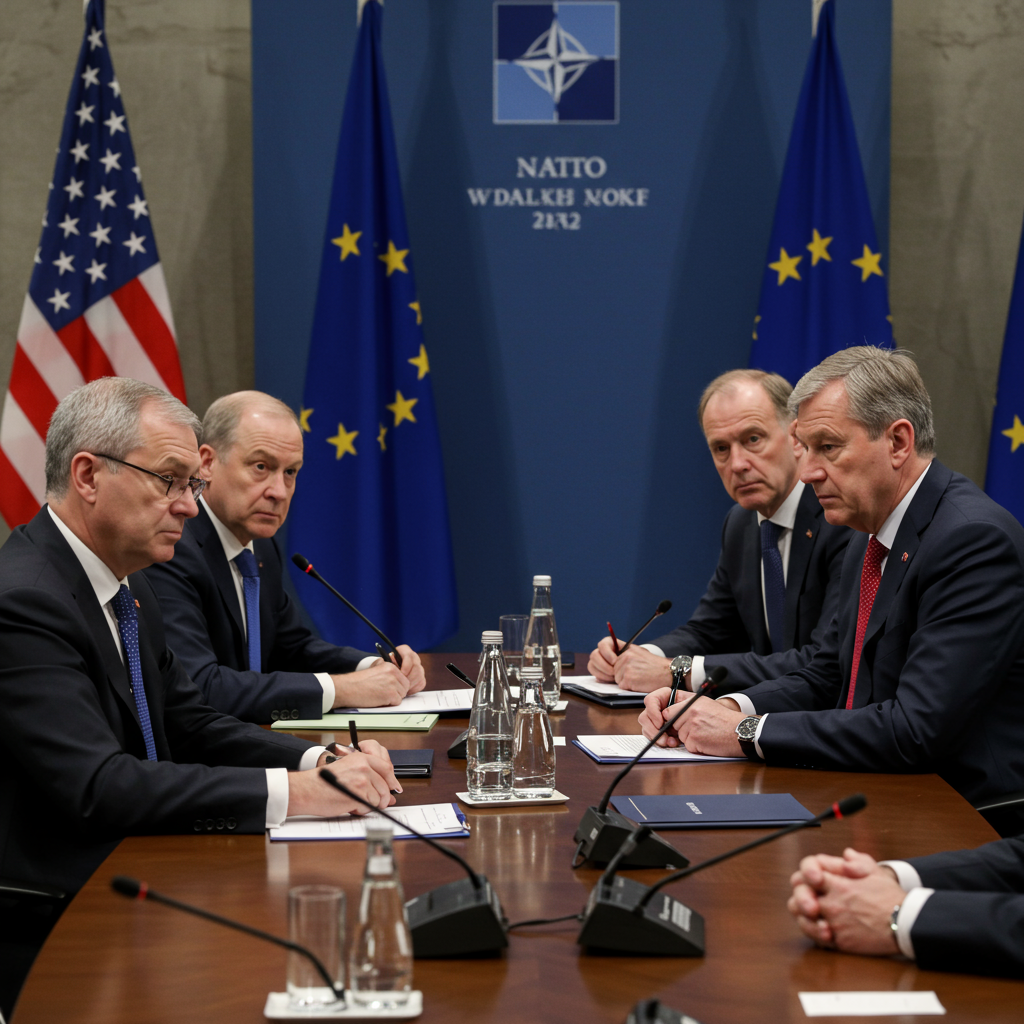Recent times have seen UK Prime Minister Keir Starmer and French President Emmanuel Macron meeting under palpable pressure. Both leaders currently grapple with challenging opinion polls and the uphill battle of championing their core political beliefs. Their shared message? A plea for patience, nuance, subtlety, and the acceptance of trade-offs in a world increasingly demanding instant solutions and exhibiting little tolerance for perceived political failures.
Observing them side-by-side revealed two figures feeling the heat. Their joint news conference featured only two lecterns and two speakers, yet two other powerful political forces loomed large, albeit unmentioned by name.
Confronting the Unseen Opponents
Neither Reform UK nor France’s National Rally – led respectively by Nigel Farage and the duo of Jordan Bardella and Marine Le Pen – were explicitly named. Their leaders remained anonymous in the formal proceedings. However, their influence was undeniably felt throughout the discussions.
These parties, operating on opposite sides of the English Channel, are distinct entities. Yet, they share a remarkable capacity to unsettle those presently holding power. They achieve this through a potent mix: fervent anti-establishment sentiment, a knack for communicating complex ideas in strikingly simple language, and capitalizing on widespread disillusionment with traditional political figures. It’s a formidable combination proving deeply resonant with segments of the electorate.
The Lure of “Easy Answers”
Prime Minister Starmer didn’t hold back in his implicit critique. He contrasted his government’s efforts with those he sees as offering simplistic solutions. “Whilst we have been working hard to get a returns agreement,” he stated, “others have been simply taking pictures of the problem.” The target of this barb, widely understood to be Nigel Farage, illustrates a key aspect of his strategy.
Starmer further elaborated on the need for a different approach. “That is where the politics is,” he insisted. “We have to show that pragmatic politics is the way to deliver the results that matter for both of our peoples.” This emphasis serves as a direct counterpoint to what he termed “the politics of easy answers,” aiming to inoculate voters against their appeal. This framing suggests a deliberate move to position the upcoming election as a clear choice between his pragmatic style and Farage’s more disruptive approach.
Across the Channel, President Macron articulated similar concerns. He, too, faces potent challenges from populist movements like National Rally at home. Macron stressed the essential need to acknowledge “the complexity of the world.” He warned against what he viewed as the “temptation” presented by some figures he described as “populists.” His argument aligns closely with Starmer’s, underscoring a shared recognition of the difficulty in navigating modern challenges without resorting to overly simplistic or performative solutions.
Migration: A Defining Political Battleground
The issue of small boat crossings has emerged as a particularly significant battleground in the political landscape, particularly in the UK. It’s a topic that encapsulates the frustration and impatience Starmer and Macron are attempting to address with calls for patience and pragmatism.
Recent polling data underscores the potency of this issue. Research from Portland Communications revealed that a notable segment of voters who supported Labour in the previous general election but have since shifted allegiance to Reform UK are paying close attention. Specifically, 26% of these switchers indicated they would be “much more likely” to return to Labour if the number of small boat crossings decreased. This highlights the direct link voters draw between perceived government effectiveness on this issue and their political choices.
The same polling offers further insights into the challenge Starmer faces. Eight out of ten Reform-leaning voters expressed the view that Labour has already had sufficient time (one year) in office to deliver improvements across various areas. This suggests a widespread lack of patience among this crucial voter group. Compounding this challenge, nearly half of all voters surveyed believe Nigel Farage is the leader who best embodies the concept of “change.”
These findings illuminate the scale of the task confronting Prime Minister Starmer. He is simultaneously hoping voters will exhibit patience while arguing that his main opponent offers a “false promise” of quick fixes. His political strategy hinges on the belief that the tangible results delivered through the deliberate application of government levers will eventually sway public opinion, given sufficient time.
The Unsettling Question: What Comes After Failure?
Beyond the immediate political challenges and election cycles, a deeper concern appears to be circulating within Westminster and Paris. Conversations with senior figures from both the Labour and Conservative parties revealed a surprising convergence of thought regarding the potential future political trajectory.
These sources, who understandably hope to avoid a Reform UK victory, acknowledged it as a genuine possibility. However, their more profound worry extended beyond this outcome. They contemplated a scenario where Nigel Farage and Reform UK might win power but subsequently be perceived as having failed to deliver on their promises, much like how many voters currently view the performance of the Conservatives and, increasingly, Labour.
This unsettling prospect raises a critical question: Where might the electorate turn next if both traditional parties and a disruptive, anti-establishment force like Reform UK are eventually deemed to have failed? In what political direction would the country pivot in the search for effective leadership and solutions? This shared anxiety among political veterans underscores a fundamental uncertainty about the long-term stability and direction of the political landscape in an era defined by rapid disappointment and a search for elusive “easy answers.”
The Enduring Value of Pragmatism
In essence, Starmer and Macron are making a complex case for complex solutions. They are arguing that genuine progress requires acknowledging difficulty, accepting trade-offs, and committing to sustained effort rather than succumbing to the allure of simplistic slogans and performative gestures. Their shared challenge is to persuade an impatient public, disillusioned by past outcomes, that patience and pragmatic, deliberate action remain the most reliable paths to meaningful change, even when navigating the turbulent waters of modern populist movements.
Frequently Asked Questions
What was the core message from the recent Keir Starmer and Emmanuel Macron meeting?
The central theme of the meeting analysis was a shared plea from Keir Starmer and Emmanuel Macron for patience and pragmatic politics. Both leaders are facing pressure and challenging opinion polls. They argued that addressing complex issues effectively requires nuance, subtlety, and the acceptance of trade-offs, directly contrasting this approach with what they termed the “politics of easy answers” often offered by populist challengers.
Which political parties were implicitly addressed by Starmer and Macron?
While not mentioned by name during the news conference, the analysis indicates that both leaders were implicitly referencing Reform UK in the UK and National Rally in France. These parties were described as having the capacity to significantly challenge the current political order by leveraging anti-establishment sentiment, simple communication, and public disillusionment.
What potential future political challenge did Labour and Conservative figures discuss?
Senior figures from both the Labour and Conservative parties privately expressed a concern that goes beyond a potential Reform UK election victory. Their deeper worry is what might happen if Reform UK were to win power but subsequently be perceived as having failed. This raises the question of where the electorate might turn next if both traditional parties and a prominent anti-establishment alternative fail to meet expectations, suggesting potential long-term political instability.


